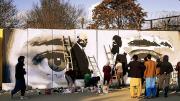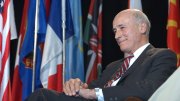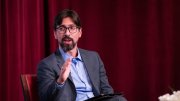On the day Kabul fell to the Taliban—August 15, 2021—Omaid Sharifi was in his usual place: on the street with a team of artists, painting a mural on one of the concrete blast walls that litter the city. An Afghan activist and artist, Sharifi had co-founded a grassroots collective called ArtLords in 2014. Since then the group had been busy decorating the massive gray barriers—suffocating reminders of bombings and violence—with colorful murals: children, women, families, doves, roses, hands holding hands, soldiers holding pencils instead of rifles, giant watchful eyes that warned warlords and politicians: “We see you.”
The murals promoted peace and empathy, denounced corruption, articulated social problems, and supported women’s empowerment. They also mourned—vehemently, pointedly—for those killed by violent attacks. In seven years, ArtLords painted more than 2,200 of these murals, on walls not just in Kabul but throughout Afghanistan. “We thought art could be an effective tool to raise awareness about social issues, to put pressure on the government,” Sharifi says, “that politically charged art could engage the citizens of Afghanistan and start a conversation.” And it did: ArtLords became widely known and widely praised; its murals won international awards. The movement attracted not only seasoned activists but ordinary citizens; many of its muralists had never before picked up a paintbrush.
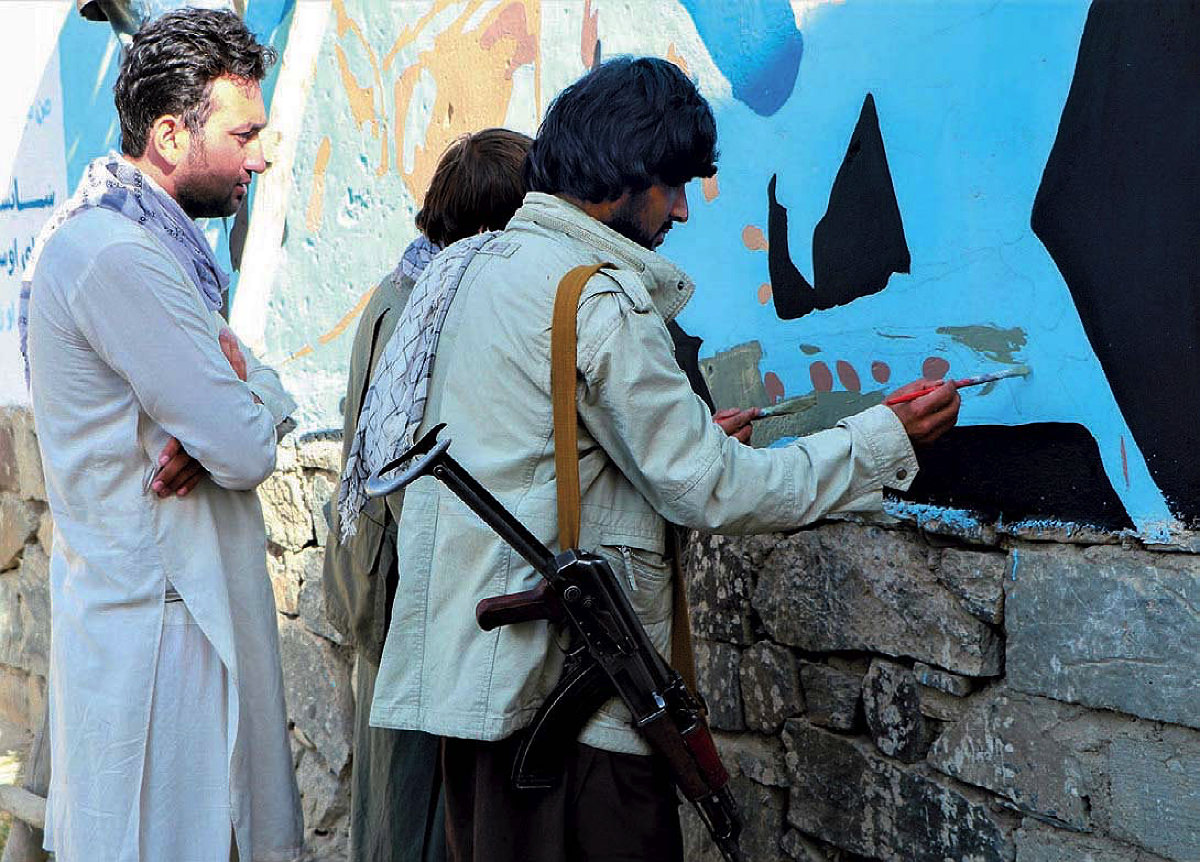
ArtLords drew both experienced artists and ordinary citizens; many of its muralists had never picked up a paintbrush before joining the group.
Photograph courtesy of ArtLords
Sharifi remembered what it was like the first time the Taliban came into power, when he was eight: “No music, no books, no expression of art. We were just sort of imprisoned in this country.” When he was 12, his father, a police officer, was shot by a mujahedeen fighter, and Sharifi, the oldest son, began working to support the family, first by selling cigarettes and cookies on the streets, and later by running a shop in the middle of Kabul. Whenever he could, he read books. “My only window to the outside,” he says. “Some of the books I had to rent, and I would have to finish in one night, because I cannot pay to rent a second night.” Sometimes he found damaged books in burned-out houses. “So I would have one chapter, but not another.”
After 9/11 and the American invasion that overthrew the Taliban’s first regime, “My world opened up,” he says—he found opportunities for study, travel, and work. “For us, in Afghanistan, it was a door that they opened, that we could dream. That we could dream again.” Sharifi and his friends founded a volunteer nonprofit in 2006, launching projects to fight corruption, clean up pollution, and help victims of floods and earthquakes. “We were encouraging young people to come together and do something for their own country.” ArtLords came into being as the U.S. presence started to wane.
By 2021, the deadline for American withdrawal approached, and the Taliban’s growing strength was increasingly clear. Sharifi had lost friends, a cousin, a sister-in-law, to bombings. In 2018 ArtLords was attacked and three members were killed, including one of its co-founders. Another ArtLords artist, a young woman, died in an explosion in June 2021.
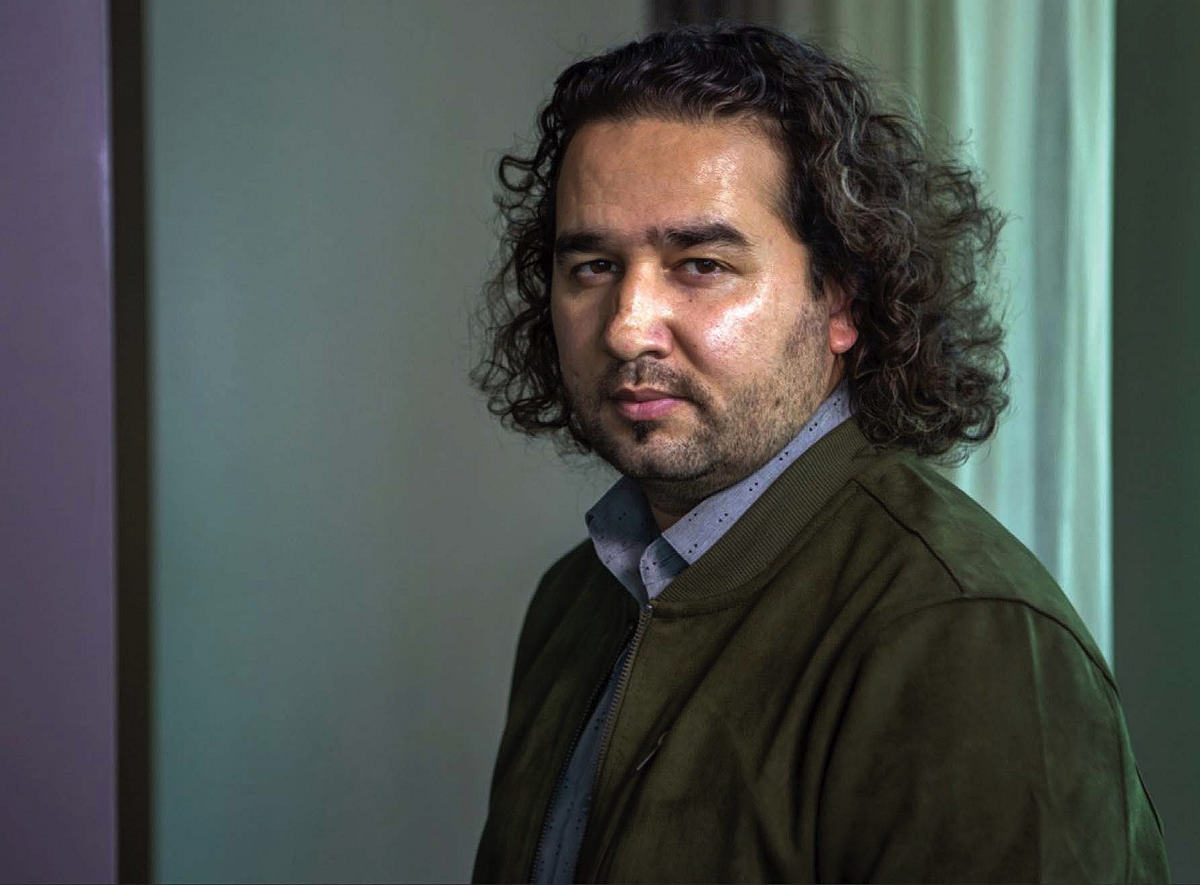
Omaid Sharifi
Photograph by David Peterson
Still, August 15 took Sharifi by surprise. He and fellow activists spent half the day painting in downtown Kabul, and then suddenly, around noon, they saw people panicking and running through the streets. He asked what was happening. “The Taliban are here!” At first he couldn’t believe it. But within an hour, “Everything changed,” he says. Phones stopped working and traffic filled the streets. Sharifi walked back to his office, frantically calling female friends and co-workers, and his five sisters, to see if they were safe. At about 3 p.m., word spread that the president, Ashraf Ghani, had fled. “And this was exactly the moment that I knew it was real,” Sharifi says. “Nobody is in charge. Nobody is here to protect the people.”
The next eight days were filled with terrifying uncertainty. Sharifi did not want to leave his country, but he realized he had to. “Almost everyone in Afghanistan knew my face,” he says. Five times, he went to the airport, but the spiraling chaos pushed him back. Eventually, he reached contacts outside the country and in the United States, who got him and his family on a bus, and then an airplane out of Afghanistan. (Sharifi helped 54 other Afghan artists escape to safety as well.) He spent a couple of months in a refugee camp in Abu Dhabi before flying to Virginia, and then finally to Boston, where he had been offered a fellowship in Harvard’s Scholars at Risk Program.
An Ending and a Beginning
For two decades, the University has provided visiting fellowships to researchers and artists from around the globe who are threatened because of their work, politics, or identity. For some, the danger is so acute that even after they arrive, they cannot disclose their participation. The scholars spend 10 months to a year on campus, recuperating and reconnecting, finding ways to continue their work and their lives. Part of a broader international network that includes hundreds of organizations, Harvard’s program is the largest of its kind in the country. Roughly 100 academics from more than 30 countries have come to its campus this way. During a normal year, the University hosts between four and six scholars.
But the past couple of years have not been normal. The collapse of Afghanistan and the war in Ukraine put hundreds, if not thousands, of scholars and artists suddenly and simultaneously in danger. “Afghanistan was a new level—a critical crisis, where the entire higher education sector, and much of the society, was instantly at risk of collapse,” says Robert Quinn, executive director of the Scholars at Risk Network. “We’ve never had to deal with so many different hotspots in the world at one time,” adds Allan Goodman, M.P.A. ’68, Ph.D. ’71, CEO of the Institute of International Education, which has been helping threatened academics for more than a century through its Scholar Rescue Fund. “What has changed is that instead of one or two identifiable crises every year, for the past five years we’ve had five to 10 crises—and this last year we’ve had more than a dozen.”
After the Taliban’s takeover, Harvard rushed to expand its program, inviting 24 Afghan scholars, alongside the usual four to six from elsewhere. Sharifi was one of the first Afghans to arrive, with only a backpack and the clothes he was wearing. Others have followed on a rolling basis; the last ones will hopefully make their way to Cambridge by this spring.
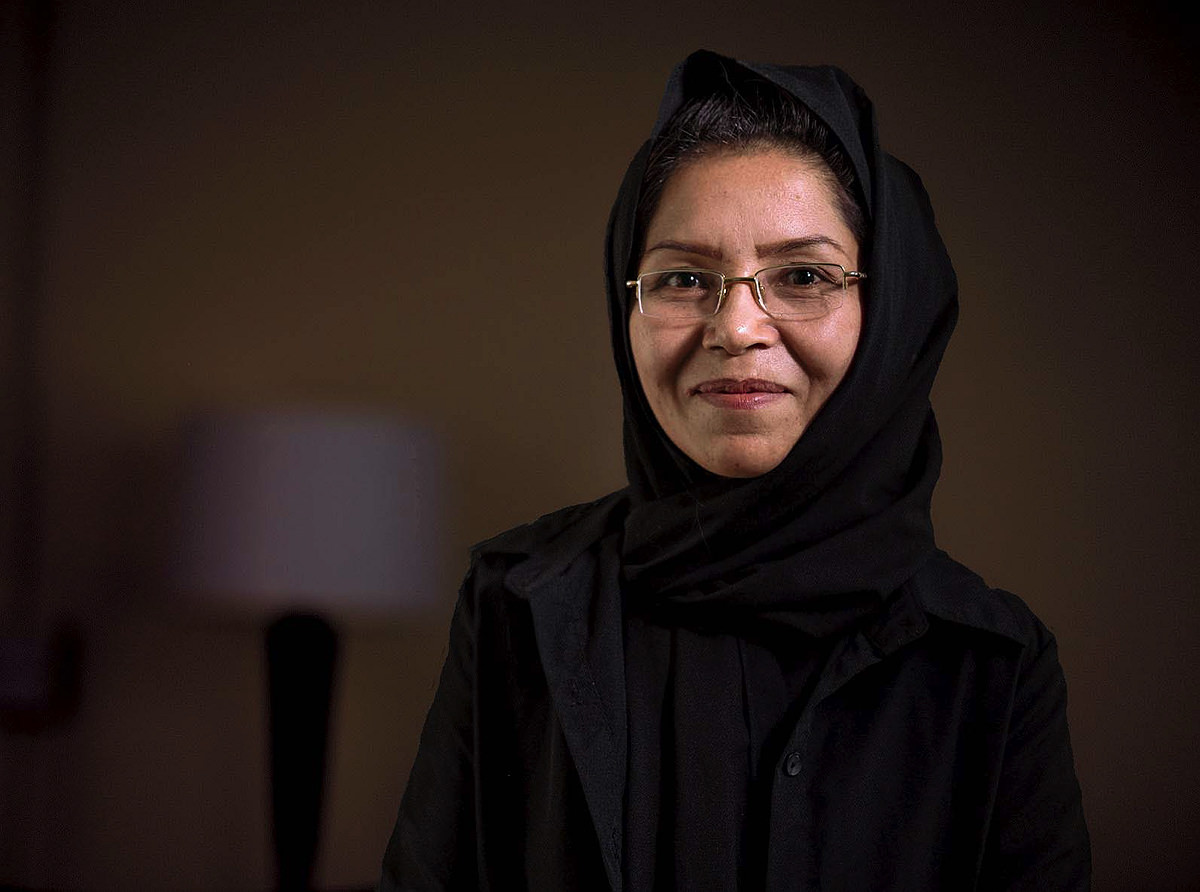
Mastora Shafahi
Photograph by Jim Harrison
Many of the Afghan scholars had advocated for women’s rights and access to health care and education. Among them are librarians, curators, obstetricians, and the principal of an all-girls school. Mastora Shafahi arrived last summer. A renowned midwife—the first from her impoverished mountain province to earn a degree in midwifery—she founded an organization that gave scholarships to hundreds of girls in fields like dentistry, pharmacy, and reproductive health. Sima Samar, a doctor and human rights activist, lived in exile in Pakistan for most of the 1980s and ’90s, operating clinics and schools for girls and women on both sides of the border, regularly facing down the Taliban. In 2002 she returned to Kabul to take part in the transition government; after a brief, turbulent stint as minister of women’s affairs (she was forced out after questioning conservative Islamic laws), she spent 17 years running the Afghan Independent Human Rights Commission. “I keep saying this: I’m still not getting out of the shock,” she says, more than a year after the Taliban seized power for the second time. “I can’t believe I saw the repetition of history in my life again.” Faramarz Jahanbeen, a physician and public health expert, worked in part to improve care for mothers and newborns and helped coordinate research on medical care in rural clinics. He also co-founded Afghanistan’s chapter of the Women’s International League for Peace and Freedom, a worldwide human-rights organization. He fled with his family after months of escalating threats from the Taliban that led to a frightening confrontation on his way home from work, with two gunmen on an isolated road. After evacuating, he and his wife and children spent seven months in a refugee camp, an agonizing limbo, before finally securing the paperwork to come to Boston.
“That moment when they arrive is usually the culmination of weeks if not months of being in touch, often every day,” says Jane Unrue, director of Harvard’s program.
“That moment when they arrive,” says Jane Unrue, director of Harvard’s Scholars at Risk Program, speaking of the scholars, “is usually the culmination of weeks, if not months, of being in touch, often every day,” to work out visas and evacuation plans. (“I was calling Jane all the time,” Jahanbeen remembers. “She kept telling me, ‘You are close, you are close.’”) Unrue sees each fellow’s arrival as both an ending and a beginning. “They’re excited to get to work,” she says. “They have been through so much. Most of them have been in hiding and under extreme pressure, in some cases physical abuse.” One arriving scholar, she says, was beaten by the Taliban before she could escape. “And then to see her come down that escalator at Logan in Terminal E, which is my favorite terminal”—where international flights arrive—“it took my breath away.”
Between “Peace and No Peace”
They never forget home. “That’s one thing all our fellows have in common,” Unrue says. “They always spend part of every day on the subject of home: reading the news, talking to family, trying to be helpful. It’s a burden they carry.” One terrible irony is that often the danger that forces scholars to flee is inseparable from their attachment to home: their desire to make their countries freer, fairer, more open, more beautiful. Afterward, they must figure out how to continue caring from afar for the home they have lost.
This is especially true for those who’ve recently arrived. Nicholas Opiyo, a Ugandan human rights lawyer whose fellowship ended in December, spent his months at Harvard compiling a legal strategy for reopening the civil liberties organization he led in Uganda, which was shut down by the government. He cannot go home yet—it’s still too unsafe, and disappearances and torture there are rising again—so he is heading to Columbia Law School to continue his work.
Those who have been away for longer also remain deeply tied to homes they cannot easily return to. Claudia Escobar Mejía, a former judge from Guatemala, received a Harvard fellowship in 2015 after exposing widespread corruption; now a visiting professor at George Mason University, she leads a new program giving fellowships to Central Americans similarly forced to relocate. Islamic studies scholar Amna Afreen, who fled death threats in Pakistan, now teaches second grade in Baltimore public schools—not an obvious congruence, but a real one, she says: she grew up poor in Karachi, and in the faces of her students, who struggle with poverty and neglect, she sees childhood friends and cousins. “I feel like I’m still serving my community,” she says. Bhion Achimba, a gay Nigerian poet, recently changed his name (from Chibuihe Obi Achimba), partly to separate himself from the expectations of his old life back home. And yet, in his poetry, he returns home again and again, trying to understand Nigeria and its civil war.
For the Afghan scholars, the burden is raw and acute. “I never had the intention to leave my country,” says one, the words catching in his throat as his composure falters. Shafahi, the midwife, follows the news about schoolgirls killed by the Taliban—especially those who, like her, are members of the long-persecuted Hazara ethnic group from Afghanistan’s remote central highlands. “Life is hard for us,” she says. She tries to get Westerners to pay attention. Speaking over video chat from her Cambridge apartment, she holds her cell phone up to the screen, showing a photo of a young woman on what looks like a gurney. “This was my friend,” she says, a university student who died in a recent bombing. In the photo, the woman’s right arm is curled around something: “The Taliban killed her holding her book.”
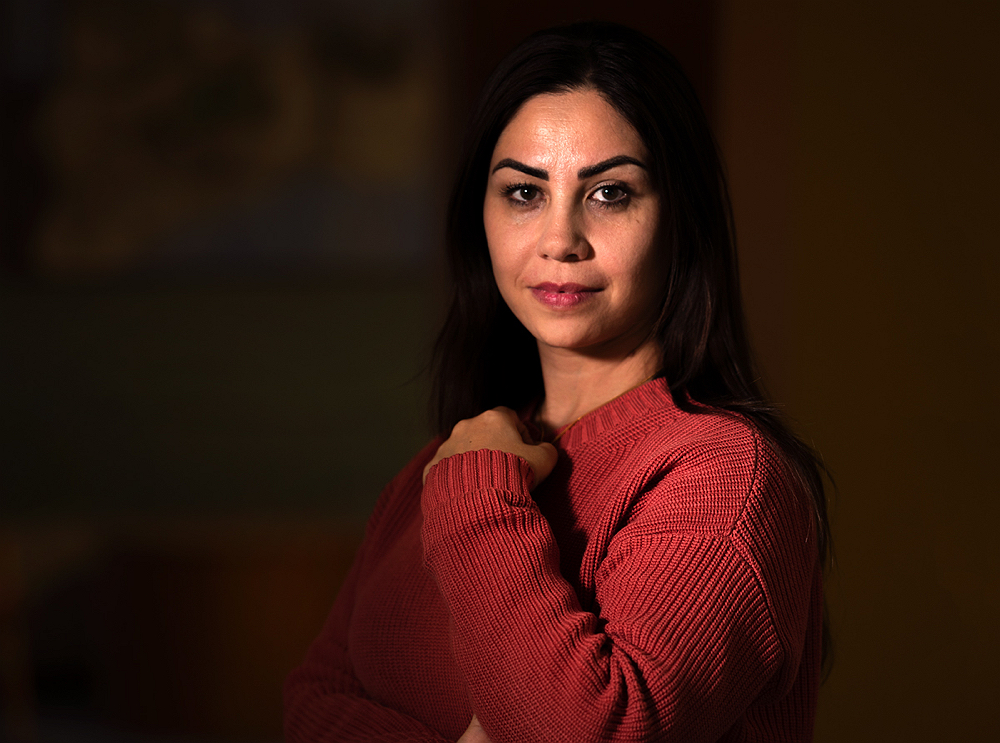
Homeira Qaderi
Photograph by Jim Harrison
For some, the choice about how to proceed is not always clear. At first, Homeira Qaderi planned to stay and fight. “I had experience with the Taliban already,” she says, when she was a teenager. Her 2020 memoir, Dancing in the Mosque: An Afghan Mother’s Letter to Her Son, recounts that experience; it’s a searing chronicle of rebellion and bravery—and loss: the book ends with an abrupt, devastating divorce that costs her the custody of her 19-month-old son. She would not see him again for three years.
Within days of the Taliban’s 2021 victory, though, Qaderi knew she had to leave. It was too dangerous to stay and speak out. At Harvard, she feels split between “peace and no peace,” as she calls it. (She and her son, now nine, arrived together in early 2022.) “I cannot understand where I am,” she says, sitting in the sunny, early-fall chill of Radcliffe Yard. “Yes, I am here. But I am with my family in Afghanistan. And they are all in trouble.” After the Taliban returned, her father had a stroke, and her brother, a journalist, was arrested; her young female cousins are “drowning in grief” for all they have lost.
And so Qaderi does what she can: she writes. “I don’t have a gun,” she says. “My pen is my gun.” She is working on a collection of short stories in Farsi about divorce and liberation; she’s also been writing op-eds in English-language newspapers on the protests in Iran and the struggles of Afghan women: confined to their homes, without schools, without rights. “I came out of my country not just to survive here,” she says. “I came to speak for women.”
She also teaches. When the Taliban first arrived in 1996, Qaderi, then 13, secretly organized literature classes for herself and other girls in her hometown of Herat. They called it the Golden Needle Sewing Class. “We all hid our notebooks beneath pieces of embroidery fabric, scissors, thread, and packages of needles,” she writes in the memoir. At Harvard, Qaderi revived the Golden Needle classes, teaching creative writing over Zoom to young Afghans—mostly girls and women, 40 or 50 at a time. “It is not just a writing class; it is a time when we are together,” she says. They meet twice a week, and she stays in contact afterward “because I know they need me. There are 5 million girls in Afghanistan, and I cannot be with every one of them. But I can be with some.”
“Our Peers Who Are Facing Persecution”
The Scholars at Risk Program got its start 1,000 miles away, in Chicago during the late 1990s. Its founder, Jacqueline Bhabha, a longtime human rights lawyer, was then director of the Human Rights Program at the University of Chicago. One day a colleague, literary scholar Katie Trumpener, A.M. ’83, heard a public radio story about persecuted intellectuals around the world. Trumpener, who’d spent time in Germany and Central Europe, thought of the Jewish and anti-fascist scholars who’d sheltered in American universities during the 1930s and ’40s. She called Bhabha. “‘Why don’t we have something like this now?’” Bhabha remembers her asking. “And that was the seed, in a way.” With a grant from the MacArthur Foundation, Bhabha and several colleagues launched what later became the Scholars at Risk Network, an international umbrella organization now based at New York University. “The idea was to create a network of solidarity with scholars,” she says. “It wasn’t just a kind of abstract idea….It was a question of the responsibility”—tangible, active—“that people in the academy have to our peers who are facing persecution.”
In 2001, Bhabha joined Harvard, where she is professor of the practice of health and human rights at the Harvard School of Public Health and research director for the FXB Center for Health and Human Rights (with additional lectureships in the Law School and the Kennedy School). She helped found the University’s Scholars at Risk Program alongside Stephen Greenblatt, Cogan University Professor. (The two co-chair the interdisciplinary faculty committee overseeing the program.) “It’s important not to feel just passive,” Greenblatt says, “not to throw up one’s hands and say, ‘Oh, there’s nothing I can do! Isn’t the world a terrible place?’ I mean, that’s not an adequate response. And it’s particularly not an adequate response if you’re at a powerful, prestigious, and wealthy university such as ours, full of people who are eager to help.” In 2002, Harvard’s first scholar at risk arrived: Mesfin Woldemariam, an Ethiopian geographer who was facing imprisonment for research suggesting that Ethiopia’s famine was caused by political forces rather than natural ones.
Bhabha and Greenblatt laid down a few principles early on. One was the understanding that, while persecution could be tied to scholars’ work, it could also simply be about who they were: “The wrong color, the wrong religion, the wrong sexuality, the wrong gender,” Bhabha says. Another was that incoming fellows must be hosted not only by the program itself but also by a University department or unit relevant to their research. This meant immersion in a community and access to laboratories, libraries, and research collaborators. Over the years, scholars have found their way to many centers and institutes, every professional school, and a list of academic departments too numerous to name. “The idea is to help restore to someone not only their physical life but also their life as a scholar and an intellectual,” Greenblatt says: no longer victims and refugees, but scholars rejoining the academic world.
“Harvard Took a Massive Chance on Me”
Bhion Achimba, the Nigerian poet, remembers that feeling, of stepping back into the academic world and finding himself alive in it. In 2017, he was abducted and held for several days, after publishing an essay in which he identified himself as part of a movement of queer Nigerian writers and described some of the violence they’d endured. After his release, he spent two years in a shelter in his home country, under the protection of Amnesty International. During that time, he saw almost no one. Arriving at Harvard, with its constant buzz of people and activity, was overwhelming. For months, whenever he would walk into a room or a building, he’d reflexively shut the door behind him, a habit ingrained after years of isolation and danger.
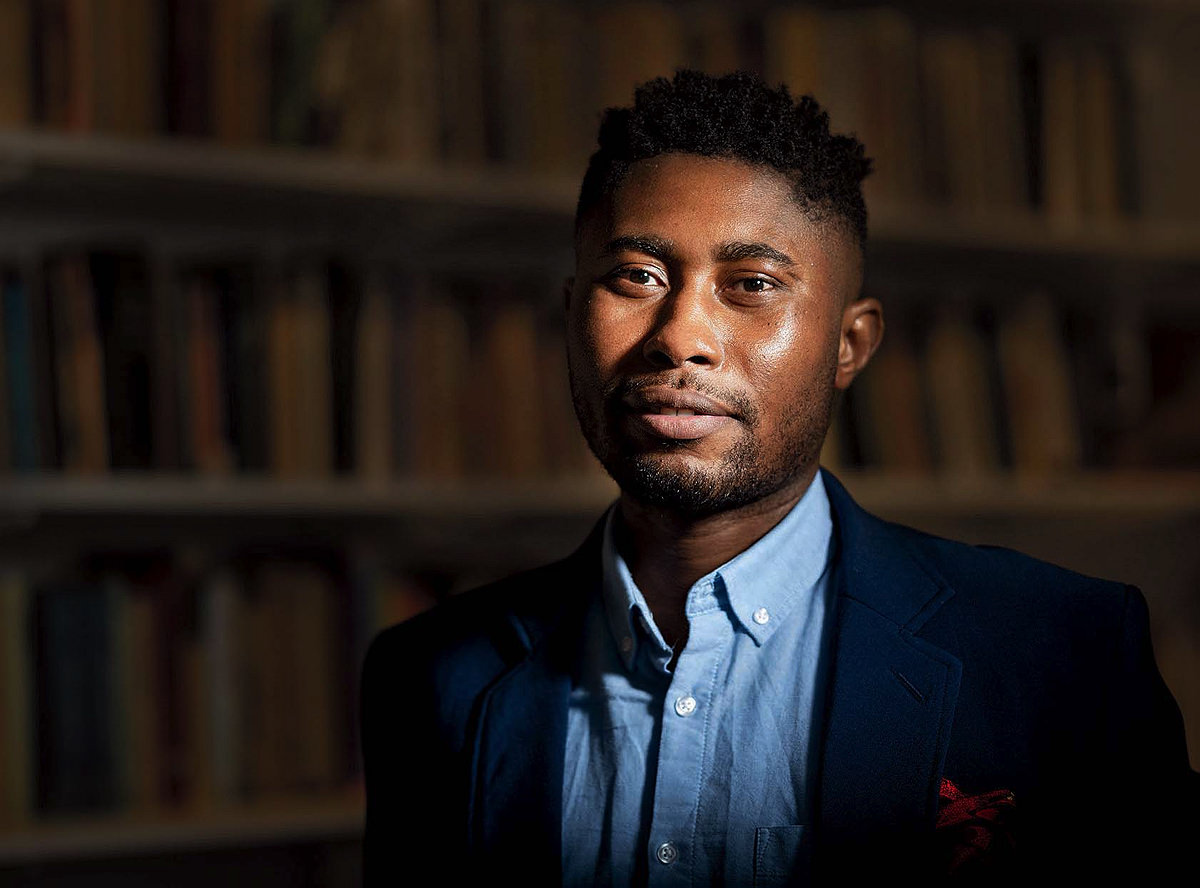
Bhion Achimba
Photograph by Jim Harrison
But the Woodberry Poetry Room in Lamont Library was transformative. “I didn’t realize you could enter a space completely surrounded by poetry,” says Achimba, who recently earned his M.F.A. at Brown University and is now a visiting fellow there. “At Harvard, I really came into my identity as a writer,” he says. “People always introduced me as a writer from Nigeria. It began to mean something to me: being a professional writer, being a writer outside my home country, and the responsibilities that come with that.” At Lamont, he met other poets, took part in readings and conversations. He spent hours in the poetry room, absorbing, existing, writing. He audited a course taught by Jesse McCarthy, assistant professor of English and African and African American studies, on the literature of displacement. It opened up internal landscapes Achimba hadn’t known were there: “That was life-changing, really.”
For Amna Afreen, the Pakistani Islamic studies scholar, Harvard’s libraries became a lifeline. In 2014, she was riding in a car with her mentor, Muhammad Shakil Auj—a Karachi University professor whose liberal interpretation of Islam had provoked death threats and a fatwa—when he was shot dead by a gunman on a motorcycle. Afreen was wounded in the arm. Immediately, threats began arriving over text and social media. “Every day, more and more,” she says. “I was so scared.” An emergency application was made to the Scholars at Risk Program, and soon she arrived in Cambridge, shaken and grieving, but also driven to answer new questions about the dynamics of fundamentalism and why some societies leave no room for moderate Islam. During her fellowship, she practically lived at Widener Library. “I used to bring my husband, and his job was to carry books,” she says. “I felt like I was in a jungle of libraries, just blindly reading.” She was deeply traumatized, still in shock, but the research—and the freedom to do it—offered some healing. “When you are a researcher, you are always thinking; that’s what you do,” she says. “So that’s what I did.”
A year’s worth of freedom and security was like rocket fuel for Thrishantha Nanayakkara, a Sri Lankan robotics engineer. In the early 2000s, he was a lecturer at the University of Moratuwa, working on a biology-inspired robot that could detect land mines—needed after years of civil war between the Sri Lankan government and the separatist Tamil Tigers. “I was fascinated at reptiles like iguanas that could walk in the minefields without getting hurt,” he says, and mongooses, whose powerful noses could sniff out smells buried deep underground. His research team was working with the engineers brigade of the Sri Lankan army.
“I came out of my country not just to survive here,” says Afghan writer and literary scholar Homeira Qaderi. “I came to speak for women.”
Things started to fall apart when he was asked to join a government committee and found himself pulled into discussions about military procurement. “It got messier and messier.” He was often at odds with the officials in charge. Amid a controversial decision about a military purchase, Nanayakkara refused to sign a document and began receiving threats. A newspaper editor who published a story about the controversy was beaten to death in broad daylight. Nanayakkara began going to work very early or very late, taking random routes home. He tensed up whenever a car braked suddenly, or a bicycle sped past, or a stranger made eye contact. During one six-month period in 2006, he and his family—a wife and two small children—moved three times. “It came to a point where I couldn’t live like that anymore.”
He arrived at Harvard in 2007 and stayed for two years, first as a scholar at risk, and then as a Radcliffe Fellow. He returned to the landmine-detection project, collaborating with Harvard and MIT researchers; that work eventually yielded a successful startup, launched by a graduate student he’d mentored. In 2009 he moved to England, where he’s now a professor at Imperial College, studying what he calls “embodied intelligence”: the idea that body parts like knee joints and inner ears are not just machines that take orders from the brain but “bodily computers” with their own problem-solving abilities. That work has led him to a startup of his own, developing tools for precision farming.
“Harvard took a massive chance on me,” Nanayakkara says now. His work was still largely unknown in 2007, his potential mostly untested. Meanwhile, the threats against him were real but hard to prove. “Not many institutions in the world have the courage or the ability to take somebody like me in.…But the Harvard committee supported me, and they gave me total freedom to follow what I wanted to do. This cannot be done everywhere. It is a rare thing, and it is so important.”
The reverse is also true: for all that scholars gain from Harvard’s program—safety, freedom, connections, encouragement—the University gains at least as much. The academics who come are often at the top of their fields, with knowledge that exists nowhere else on campus. Often, they complete important work while they’re at Harvard: a novel, a patent, a paper. Fellows don’t usually teach (“We want them to have this year to focus on their work,” Unrue says), but they do interact with students and collaborate with other researchers. Harvard students often sought out Opiyo, the Ugandan human rights lawyer, who was instrumental in criminalizing torture in his country and helped overturn an anti-gay law there in 2014. He spoke at the Kennedy School’s Carr Center for Human Rights, the Weatherhead Center for International Affairs, the Harvard Political Review, and the Law School. He helped a law student working inthe Immigration and Refugee Advocacy Clinic write a brief for a Ugandan client seeking asylum.
“This work straddles human rights advocacy, academic solidarity, and casework,” says Jacqueline Bhabha. “It's everthing from finding warm jackets to helping people arrange the right lawyer, to talking to the chair of a department.”
“A Kind of Unbelievable Blessing”
When people talk about the strength of Harvard’s program, they almost always end up talking about Unrue. “She’s amazingly committed,” Bhabha says. “This work straddles human rights advocacy, academic solidarity, and casework. It’s everything from finding warm jackets to helping people arrange the right lawyer, to talking to the chair of a department to persuade them to take somebody as a fellow.” As the program’s only full-time staff member, Unrue receives every application and fields every desperate query from scholars seeking refuge. She helps coordinate escape routes and evacuations, works with the legal team on visa petitions, and puts together the fellowship packages—each one individually designed around the needs and interests of a particular academic or artist. She’s the person on the phone with scholars every day—or night, at almost any hour—until they can get to Boston, and once they arrive, she’s the first face they see at the airport. She finds housing, helps with medical appointments and new clothes (many arrive with few possessions). She helps locate schools for fellows’ children and placements for their spouses. “Dear sister Jane,” Shafahi calls her. Qaderi describes how Unrue’s presence steadies her son: “When she sends any message, he reads it because he finds peace with her. He lost his friends, he lost his family, and everything he had. He needs peace, and he takes peace from knowing Jane.”
“She’s everything for them,” says Julie Trébault, director of the Artists at Risk Connection, a project of PEN America founded in 2017. “And she’s everything for us, to be honest. I consider Jane one of my strongest allies.” Unrue is a crucial adviser to numerous organizations like Trébault’s, and over the years has assembled a network of partners around the world who meet regularly to discuss international crises and to strategize ways to bring more scholars to safety, if not at Harvard, then elsewhere. “One of the leading, extraordinary souls … in our global network,” says Quinn. “She is in every sense of the word good,” Greenblatt says. “Jane happens to us by a kind of unbelievable blessing.”
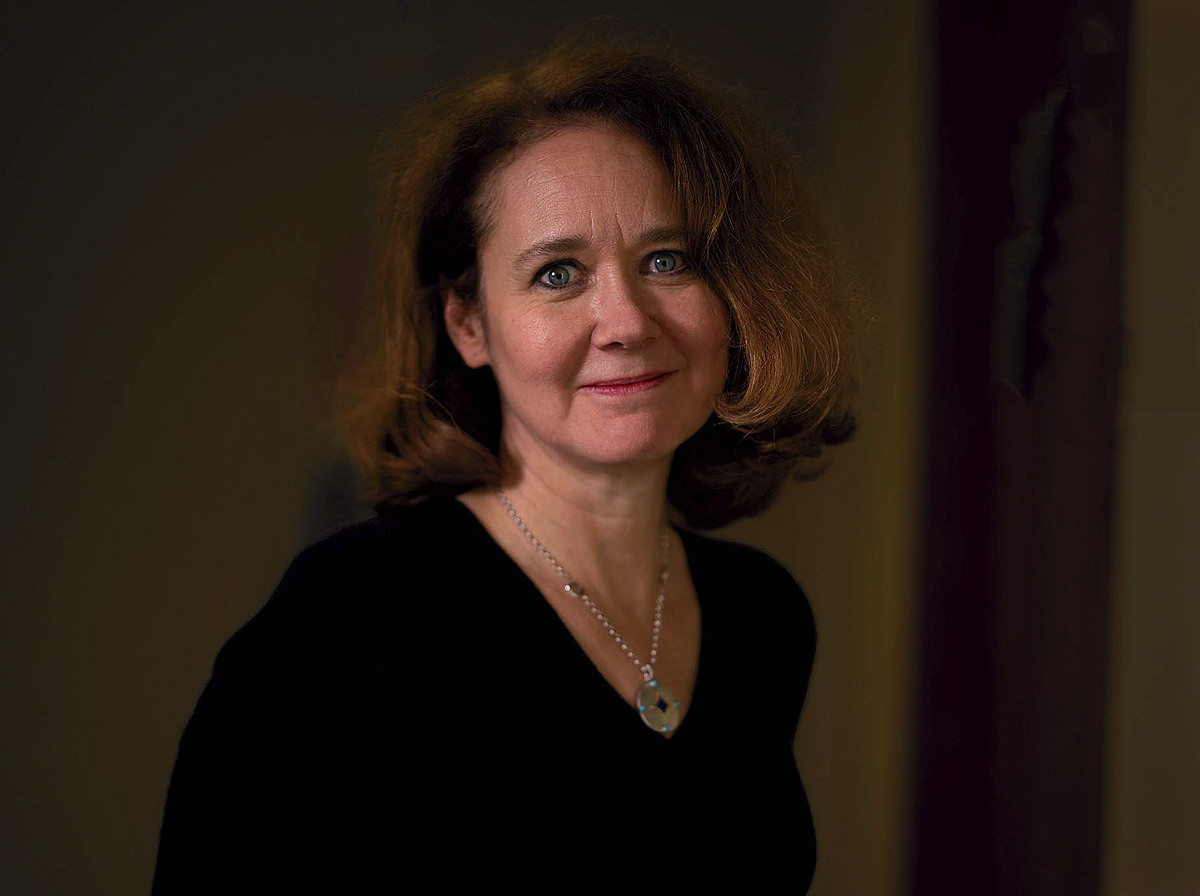
Jane Unrue
Photograph by Jim Harrison
And almost by accident, at least at first. In 2005, Unrue, a novelist and short-story writer, was teaching an expository writing course called “The Voice of Authority,” for which she invited dissident writers to her classroom to speak. One of them was Shahriar Mandanipour, an award-winning Iranian novelist and editor on a visiting fellowship at Brown. Unrue discovered he was scheduled to return home at the end of the year. “That alarmed me,” she says. “He was very much at risk….I just felt like I had to try to help.” The still-fledgling Scholars at Risk Program had already filled its openings for the year, so she sought funding elsewhere to bring him to Harvard. In the end, the money came from an unexpected source: the comedian and late-night entertainer Jimmy Kimmel, who was one of Unrue’s closest friends growing up in Las Vegas. He contributed $70,000 and then funded Mandanipour for a second year at Harvard, where the novelist wrote, among other things, his best-selling book, Censoring an Iranian Love Story. Now an American citizen, Mandanipour lives in California. (During a 2016 fundraising event for the program, Kimmel finally met him in person. “It was kind of beautiful, actually,” Kimmel says. “It really hits you, like, ‘Oh look, this is a real person, and now here he is, safe and able to work.’”) Unrue joined the program’s committee in 2005, and by 2007 was its de facto manager. Under her stewardship it has grown substantially; she was named as full-time director in 2020.
Today, it costs about $125,000 to host each fellow. Scholars often bring family with them—usually spouses and children—and the money covers a $70,000-$80,000 stipend, plus travel and health benefits for fellows and their dependents. In addition, Harvard also helps with housing: sometimes University housing, sometimes apartments. “Anything and everything we can possibly come up with,” Unrue says. “Housing is one of the things that wakes me up at night.” The program depends on funding from a variety of sources: the Harvard president’s office; the individual schools, departments, and centers where scholars embed themselves academically; and outside donors and foundations (fundraising is another thing that wakes Unrue up at night).
The program has benefited from the support of President Lawrence Bacow, whose office provided an unprecedented level of funding during the recent period of critical need. As the son of refugees who fled the Holocaust, “I have a sense of what it’s like to be at risk and trying to get out of a country,” he says. Bacow’s mother, who spent World War II in Germany, was the only member of her family to survive. “So for me, this is personal.” It is also institutional, in line with other actions Bacow has taken on immigration and refugees: lobbying in Washington, D.C., on behalf of DACA students (who were brought to the United States undocumented as children), advocating for an incoming Palestinian freshman who was turned away at the border in 2019, nudging China’s Xi Jinping on the detention of Uyghur scholars.
“Every Rescue Is Bespoke”
The work of rescuing scholars and artists has always been complex and difficult. “Our fellows are not like other fellows,” Bhabha says. “They come with no bank account and maybe a single suitcase, or with no documents, and often with unbelievable trauma.” These days the effort is perhaps even more complex. “Every rescue is bespoke—that’s the nature of it,” says Goodman, of the Institute of International Education. But families have grown, and crises have multiplied. Quinn, of the Scholars at Risk Network, notes that rescue work has always been both chronic and acute: “What has changed is the volume of need and the visibility of the problem.”
At Harvard, Unrue’s experience has been similar, which increases the urgency of another part of her job: helping fellows find a place to land after their Harvard fellowship ends, whether that’s another fellowship elsewhere, or permanent residency, or full-time employment. “I feel very responsible for that,” she says. “I never forgot that feeling of alarm about Shahriar.” This work begins as soon as the fellows arrive because most scholars at risk cannot simply go home after their year in Cambridge. Many of them never will. “Really,” Bhabha says, “we’re talking about exile.”
That is true, at least at the moment, for Omaid Sharifi. Within a month of his departure from Kabul, the Taliban had painted over all of ArtLords’ murals. Sharifi felt as if he’d lost a limb. When asked about Afghanistan now, he says he doesn’t know when he’ll be able to go back, but the activism continues, he says, though it has gone underground. He has colleagues still on the ground there. The work he’s done at Harvard is all geared toward home. “We never stopped working inside Afghanistan, from August 15 to now,” he says. “We have an office in Virginia”—where Sharifi’s family has settled—“we have an office in Istanbul. We are working with artists and activists all over the world, working with Afghan refugees here in the States, in Europe, in the Middle East. So our work has expanded.” Recently Sharifi helped curate a pair of exhibitions based on ArtLords’ artwork, in Washington, D.C., and Toronto. “We have the platform now to keep advocating for Afghanistan and for the people of Afghanistan and for their aspirations for democracy and freedom. We cannot look away.”
